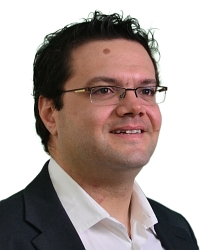NEWS IEEE-NH ComSig lecture by MERL's Petros Boufounos
Date released: April 4, 2019
-
NEWS IEEE-NH ComSig lecture by MERL's Petros Boufounos Date:
April 4, 2019
-
Where:
Nashua Public Library, Nashua, NH
-
Description:
MERL's Petros Boufounos gave a lecture for the IEEE-NH ComSig chapter at the Nashua Public Library as part of the IEEE Signal Processing Society Distinguished Lecturer series.
Title: "An Inverse Problem Framework for Array Processing Systems."
Abstract: Array-based sensing systems, such as ultrasonic, radar and optical (LIDAR) are becoming increasingly important in a variety of applications, including robotics, autonomous driving, medical imaging, and virtual reality, among others. This has led to continuous improvements in sensing hardware, but also to increasing demand for theory and methods to inform the system design and improve the processing. In this talk we will discuss how recent advances in formulating and solving inverse problems, such as compressed sensing, blind deconvolution, and sparse signal modeling can be applied to significantly reduce the cost and improve the capabilities of array-based and multichannel sensing systems. We show that these systems share a common mathematical framework, which allows us to describe both the acquisition hardware and the scene being acquired. Under this framework we can exploit prior knowledge on the scene, the system, and a variety of errors that might occur, allowing for significant improvements in the reconstruction accuracy. Furthermore, we can consider the design of the system itself in the context of the inverse problem, leading to designs that are more efficient, more accurate, or less expensive, depending on the application. In the talk we will explore applications of this model to LIDAR and depth sensing, radar and distributed radar, and ultrasonic sensing. In the context of these applications, we will describe how different models can lead to improved specifications in ultrasonic systems, robustness to position and timing errors in distributed array systems, and cost reduction and new capabilities in LIDAR systems. -
External Link:
-
MERL Contact:
-
Research Areas:
-
Related Publications
- , "Sparse Blind Deconvolution for Distributed Radar Autofocus Imaging", IEEE Transactions on Computational Imaging, DOI: 10.1109/TCI.2018.2875375, Vol. 4, No. 4, pp. 537-551, December 2018.
BibTeX TR2018-179 PDF Video- @article{Mansour2018dec,
- author = {Mansour, Hassan and Liu, Dehong and Kamilov, Ulugbek and Boufounos, Petros T.},
- title = {{Sparse Blind Deconvolution for Distributed Radar Autofocus Imaging}},
- journal = {IEEE Transactions on Computational Imaging},
- year = 2018,
- volume = 4,
- number = 4,
- pages = {537--551},
- month = dec,
- doi = {10.1109/TCI.2018.2875375},
- url = {https://www.merl.com/publications/TR2018-179}
- }
- , "High-Resolution Lidar Using Random Demodulation", IEEE International Conference on Image Processing (ICIP), DOI: 10.1109/ICIP.2018.8451424, October 2018.
BibTeX TR2018-138 PDF- @inproceedings{Boufounos2018oct,
- author = {Boufounos, Petros T.},
- title = {{High-Resolution Lidar Using Random Demodulation}},
- booktitle = {IEEE International Conference on Image Processing (ICIP)},
- year = 2018,
- month = oct,
- doi = {10.1109/ICIP.2018.8451424},
- url = {https://www.merl.com/publications/TR2018-138}
- }
- , "Radar Autofocus Using Sparse Blind Deconvolution", IEEE International Conference on Acoustics, Speech, and Signal Processing (ICASSP), DOI: 10.1109/ICASSP.2018.8462402, April 2018, pp. 1623-1627.
BibTeX TR2018-003 PDF Video- @inproceedings{Mansour2018apr,
- author = {Mansour, Hassan and Kamilov, Ulugbek S. and Liu, Dehong and Boufounos, Petros T.},
- title = {{Radar Autofocus Using Sparse Blind Deconvolution}},
- booktitle = {IEEE International Conference on Acoustics, Speech, and Signal Processing (ICASSP)},
- year = 2018,
- pages = {1623--1627},
- month = apr,
- doi = {10.1109/ICASSP.2018.8462402},
- url = {https://www.merl.com/publications/TR2018-003}
- }
- , "Coded Aperture Compressive 3-D LIDAR", IEEE International Conference on Acoustics, Speech, and Signal Processing (ICASSP), DOI: 10.1109/ICASSP.2015.7178153, April 2015, pp. 1166-1170.
BibTeX TR2015-028 PDF- @inproceedings{Kadambi2015apr,
- author = {Kadambi, A. and Boufounos, P.T.},
- title = {{Coded Aperture Compressive 3-D LIDAR}},
- booktitle = {IEEE International Conference on Acoustics, Speech, and Signal Processing (ICASSP)},
- year = 2015,
- pages = {1166--1170},
- month = apr,
- publisher = {IEEE},
- doi = {10.1109/ICASSP.2015.7178153},
- url = {https://www.merl.com/publications/TR2015-028}
- }
- , "Depth Sensing Using Active Coherent Illumination", IEEE International Conference on Acoustics, Speech, and Signal Processing (ICASSP), DOI: 10.1109/ICASSP.2012.6289146, March 2012, pp. 5417-5420.
BibTeX TR2012-020 PDF Video- @inproceedings{Boufounos2012mar,
- author = {{{Boufounos, P.T.}}},
- title = {{{Depth Sensing Using Active Coherent Illumination}}},
- booktitle = {IEEE International Conference on Acoustics, Speech, and Signal Processing (ICASSP)},
- year = 2012,
- pages = {5417--5420},
- month = mar,
- doi = {10.1109/ICASSP.2012.6289146},
- issn = {1520-6149},
- isbn = {978-1-4673-0045-2},
- url = {https://www.merl.com/publications/TR2012-020}
- }
- , "Compressive Sensing for Over-the-Air Ultrasound", IEEE International Conference on Acoustics, Speech, and Signal Processing (ICASSP), DOI: 10.1109/ICASSP.2011.5947722, May 2011, pp. 5972-5975.
BibTeX TR2011-016 PDF Video- @inproceedings{Boufounos2011may1,
- author = {Boufounos, P.T.},
- title = {{Compressive Sensing for Over-the-Air Ultrasound}},
- booktitle = {IEEE International Conference on Acoustics, Speech, and Signal Processing (ICASSP)},
- year = 2011,
- pages = {5972--5975},
- month = may,
- doi = {10.1109/ICASSP.2011.5947722},
- url = {https://www.merl.com/publications/TR2011-016}
- }
- , "Sparse Blind Deconvolution for Distributed Radar Autofocus Imaging", IEEE Transactions on Computational Imaging, DOI: 10.1109/TCI.2018.2875375, Vol. 4, No. 4, pp. 537-551, December 2018.
-
